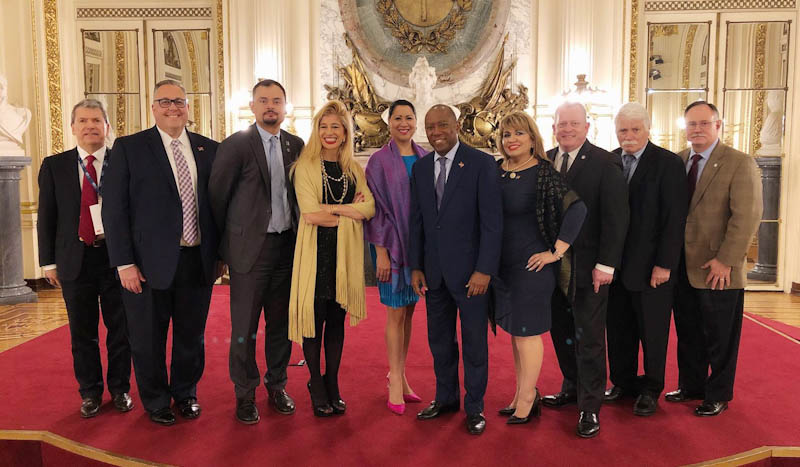Mayor Turner, Partnership Lead Trade Mission to Peru, Chile and Argentina to Grow Business, Cultural Ties
Published Jul 20, 2018 by A.J. Mistretta

HOUSTON (July 20, 2018) -- Mayor Sylvester Turner and the Greater Houston Partnership led a trade and investment mission to Peru, Chile and Argentina July 14 to July 20, 2018. The mission focused on promoting Houston's advantages for investment and trade and enhancing key government and business relationships between the Houston region and the three visited countries. Targeted business sectors included energy, trade and logistics as well as tourism. The delegation also met with high-level government officials and representatives, as well as exchange best practices on resiliency.
“This invaluable trip further cultivates Houston’s relations in South America and explore new business opportunities that may enhance the local economy, creating jobs and investments across the city,” Houston Mayor Sylvester Turner said. “Houston is home to 16,600 individuals of Peruvian, Chilean and Argentinian descent and trade relations between Houston and the three countries are valued at an average of $9 billion annually. This trade mission will allow us an opportunity to further develop our innovative sectors and diverse cultural landscape. In collaboration with the Greater Houston Partnership, we welcome these international entities to explore our business operations.”
Houston is a sought-after location for global firms seeking a location to establish their Americas headquarters. In 2017 alone, 41 foreign-owned firms opened or expanded operations in Houston, up from 25 the prior year. In addition, more than 5,000 Houston-based firms are now doing business abroad, including a number in the three visited countries. To capitalize on these key relationships, the delegation will host a series of forums to exchange best practices and intellectual capital in the target business sectors.
“Houston’s central location and proximity to North and South America make it an ideal market to move goods and commodities. In fact, seventeen percent of Houston’s economy is tied to exports, and 43 percent of that activity is with the Americas region,” said Horacio Licon, Vice President of International Investment and Trade for the Greater Houston Partnership. “Houston is uniquely positioned as a hub for the Americas, not only as a location to manufacture and export, but also as a strategic partner in the exchange of technology, expertise and best practices with our southern counterparts.”
South America is Houston’s No. 1 regional trading partner, accounting for 52 percent of all imports to Houston and 49 percent of all exports.
• Peru is Houston’s 21st largest trade partner and its fifth largest South American trade partner From 2007 to 2017, trade between Houston and Peru averaged $2.6 billion annually, and was valued at $3.0 billion in ’17.
• Houston is the second busiest gateway for U.S.-Chile trade (by value) and Chile is Houston’s 18th largest international trade partner. From 2008 to 2017, trade between Houston and Chile averaged $3.9 billion annually and was valued at $3.2 billion in 2017.
• Houston is the second busiest gateway for U.S.-Argentina trade (by value) and Argentina is Houston’s sixth largest South American trade partner. From 2007 to 2017, trade between Houston and Argentina averaged $2.7 billion annually, and was valued at $2.4 billion in ’17.
In addition to strong business and cultural ties, Houston is well-connected to South America through direct air service to the region including Lima, Peru; Santiago, Chile; and Buenos Aires, Argentina. United Airlines’ gateway to Latin America is Houston’s George Bush Intercontinental Airport where United operates nonstop service to more than 50 destinations throughout Mexico, Central America, South America and the Caribbean.
With more than 145 languages spoken, Houston is the most racially and ethnically diverse metro in the nation. In addition to business and trade opportunities, the delegation will also highlight Houston’s worldclass quality of life and cultural amenities.
“Houston is a world-class destination that is home to NASA’s Space Center Houston, a Museum District with 19 institutions, award-wining performing arts groups, professional sports teams, tax free shopping and the annual Houston Livestock Show and Rodeo. Peru, Chile and Argentina are emerging markets for Houston with non-stop air service from United Airlines and we are excited to explore opportunities to attract new visitors to Houston from each of these markets,” said Jorge Franz, Vice President of Tourism for Visit Houston, which runs the “Hola Houston” campaign in Spanish-speaking markets.
Led by the City of Houston and the Greater Houston Partnership, the delegation also included representatives from United Airlines, VisitHouston, Houston Airport System, Houston Hispanic Chamber of Commerce, Port Houston, The Woodlands Area Economic Development Partnership, among others.
 Press Releases
Press Releases


















